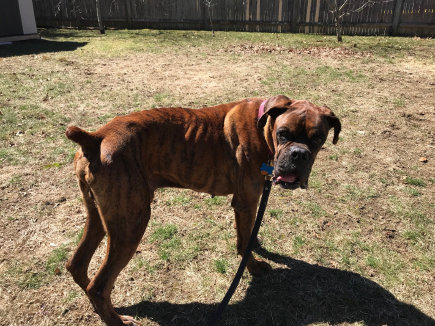THE BOXER RESCUE, INC. is a 501(c)3 non-profit Boxer Dog Rescue Organization, dedicated to rescuing Boxers in need. Located in Massachusetts. Serving New England.
|
|
|
Feeding pets food that we enjoy is not only wrong, it can also be fatal. There are some foods that humans
relish which cause illness and death if eaten by pets.
Chocolate, macadamia nuts and onions are good examples. Each of these foods
contains chemicals which rarely cause problems for humans, but for dogs, these same chemicals can be deadly. |
|
|
|
Chocolate toxicity
Chocolate
contains theobromine, a compound that is a cardiac stimulant and a diuretic.
When affected by an overdose of chocolate, a dog can
become excited and hyperactive. Due to the diuretic effect, it may pass large volumes of urine and it will be unusually thirsty. Vomiting
and diarrhea are also common. The effect of theobromine on the heart is the most dangerous effect. Theobromine will either increase
the dogís heart rate or may cause the heart to beat irregularly. Death is quite possible, especially with exercise.
After their pet
has eaten a large quantity of chocolate, many pet owners assume their pet is unaffected. However, the signs of sickness may not be
seen for several hours, with death following within twenty-four hours.
Cocoa powder and cooking chocolate are the most toxic forms.
A 10-kilogram dog can be seriously affected if it eats a quarter of a 250gm packet of cocoa powder or half of a 250gm block of cooking
chocolate. These forms of chocolate contain ten times more theobromine than milk chocolate. Thus, a chocolate mud cake could be a
real health risk for a small dog. Even licking a substantial part of the chocolate icing from a cake can make a dog unwell.
Semi-sweet
chocolate and dark chocolate are the next most dangerous forms, with milk chocolate being the least dangerous. A dog needs to eat
more than a 250gm block of milk chocolate to be affected. Obviously, the smaller the dog, the less it needs to eat. |
Onion and
garlic poisoning . Onions and garlic are other dangerous food ingredients that cause sickness in dogs, cats and also livestock.
Onions and garlic contain the toxic ingredient thiosulphate. Onions are more of a danger. Pets affected by onion toxicity will
develop haemolytic anemia, where the petís red blood cells burst while circulating in its body.
At first, pets affected by onion
poisoning show gastroenteritis with vomiting and diarrhea. They will show no interest in food and will be dull and weak. The red pigment
from the burst blood cells appears in an affected animalís urine and it becomes breathless. The breathlessness occurs because the
red blood cells that carry oxygen through the body are reduced in number.
The poisoning occurs a few days after the pet has eaten
the onion. All forms of onion can be a problem including dehydrated onions, raw onions, cooked onions and table scraps containing
cooked onions and/or garlic. Left over pizza, Chinese dishes and commercial baby food containing onion, sometimes fed as a supplement
to young pets, can cause illness.
Onion poisoning can occur with a single ingestion of large quantities or with repeated meals
containing small amounts of onion. A single meal of 600 to 800 grams of raw onion can be dangerous whereas a ten-kilogram dog, fed
150 grams of onion for several days, is also likely to develop anemia. The condition improves once the dog is prevented from eating
any further onion
While garlic also contains the toxic ingredient thiosulphate, it seems that garlic is less toxic and large
amounts would need to be eaten to cause illness.
Petís owners should not assume that human food is always safe for pets. When
it comes to chocolate, onions, garlic and macadamia nuts, such foods should not be given in at all. Be sure that your pets canít get
into your stash of chocolates, that food scraps are disposed of carefully to prevent onion and garlic toxicity and that your dog is
prevented from picking up macadamia nuts if you have a tree in your garden.
Other potential dangers are, Avocado (all parts)
- the toxic ingredient in avocado is called persin (toxic amount unknown). Symptoms include difficulty breathing, abdominal enlargement,
abnormal fluid accumulations in the chest, abdomen and sac around the heart.
Pear pips, the kernels of plums, peaches
and apricots, apple core pips (contain cyanogenic glycosides resulting in cyanide posioning)
Potato peelings and green looking potatoes
Rhubarb
leaves
Mouldy/spoiled foods (keep garbage lid firmly on)
Alcohol
Yeast dough
Coffee grounds, beans & tea (caffeine)
Hops (used in
home brewing)
Tomato leaves & stems (green parts)
Broccoli (in large amounts)
Raisins and grapes
Cigarettes, tobacco, cigars
Xylitol
(sweetener often found in sugar-free gum)
Cooked bones - they can splinter and cause gut perforation, as well as blockages in the intestine,
tooth fractures, and cooked chop bones can get stuck across the roof of the mouth
Corn cobs - a common cause of intestinal blockage
requiring surgical removal
Human Foods that Poison Pets
"The Chase" Photography by:
Patrick McArdle
"The Chase" Photography by:
Patrick McArdle

"The Chase" Photography by:
Patrick McArdle
The Boxer



The Boxer Health

Food & Nutrition
The White Boxer
The Senior Boxer







Friends of
The Boxer Rescue


Please support
The Boxer Rescue























